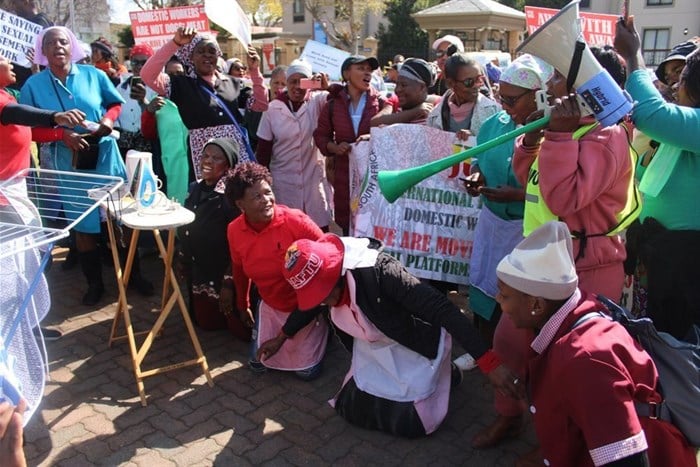Over 100 domestic workers marched to the Union Buildings in Tshwane on Friday, 4 August 2023.

Domestic workers marched to the Union Buildings in Tshwane to demand workplace compensation for injuries or death and better working conditions. Photos: Kimberly Mutandiro | GroundUp
- Over 100 domestic workers marched to the Union Buildings in Tshwane at the weekend.
- Many of them complain of racism, abuse, assault and sexual harassment by employers.
- Unions say such cases are underreported and seldom prosecuted as workers fear they will lose their jobs.
- The march marked three years since the Constitutional Court ordered that domestic workers be included in workplace compensation legislation.
Nearly three years since the Constitutional Court ordered that domestic workers be included in legislation aimed at giving them better protection in the workplace, domestic workers say they still struggle to get compensation, and they suffer widespread abuse and unfair treatment by employers.
A hundred domestic workers gathered at the Union Buildings in Tshwane at the weekend to hand over a memorandum to the Presidency.
“The rights of domestic workers are still being violated. They are suffering from sexual abuse by employers, they are being attacked by dogs, and are being exploited without any compensation. And nothing is being done about it,” said Pinky Mashiane, a domestic worker and founder of United Domestic Workers of South Africa (UDWOSA).
The marchers on Friday honoured Maria Mahlangu, who drowned in her employer’s swimming pool in Pretoria in March 2012. It was alleged that Mahlangu, who was partially blind, was washing windows next to the unfenced pool when she slipped and fell. She could not swim and drowned. Her body was discovered hours later by her employer.
The compensation matter heard by the Constitutional Court was rooted in a case brought by Mahlangu’s daughter, Sylvia Mahlangu, who was her sole dependent at the time. She was left financially devastated after her mother’s death. She approached the Department of Labour to claim compensation but was turned away.
In the landmark ruling in November 2020, the Constitutional Court ruled that domestic workers be covered by the provisions of the Compensation for Occupational Injuries and Diseases Act (COIDA) and that damages can be claimed for work-related injuries, illnesses and death.
Despite this ruling, the domestic workers’ union says it is still inundated with calls for help from workers. Many of their complaints relate to being mauled by their employer’s dogs or experiences of racism, physical and sexual assault and harassment by employers. UDWOSA leaders say that many of these cases are almost never prosecuted or are not reported as the workers fear they will lose their jobs.
The union said it found that many domestic workers across South Africa are still not registered with the Unemployment Insurance Fund (UIF) or for Compensation for Occupational Injuries and they earn well below the national minimum wage.
On 1 March 2023, South Africa’s new minimum hourly wage of R25.42 came into force.

“The rights of domestic workers are still being violated … And nothing is being done about it,” said Pinky Mashiane, domestic worker and founder of United Domestic Workers of South Africa. Photos: Kimberly Mutandiro | GroundUp
“The rights of domestic workers are still being violated ... And nothing is being done about it,” said Pinky Mashiane, domestic worker and founder of United Domestic Workers of South Africa.
Sonto Mhlangu, who works in Silver Lakes Estates, said while she welcomed earning a minimum wage, the money is still not enough to meet the current cost of living. “Many of us are paid peanuts yet the work we do is equally important. The government needs to treat us like other white-collar employees,” she said.
Siboniso Ndlovu said employers often refuse to help her with her immigration documentation. “As a migrant domestic worker, my job is not secure. I can be fired anytime due to the documentation issue,” Ndlovu said.
She earns R2,000 a month and says her employer refuses to increase her salary.
Other demands included that the government ban the breeding and ownership of pit bulls. They also want employers to face attempted murder charges if a domestic worker is attacked.
Eunice Dladla of the South African Domestic Service and Allied Workers Union said, “Employers do not want to comply with labour laws. We have found that it’s only a few who give their domestic workers the stipulated minimum wage. They are ill-treated, undermined and discriminated against by employers.
“We have cases where domestic workers are impregnated by employers who refuse to take responsibility. We will keep protesting until the government intervenes.”
This article was originally published on GroundUp.








































